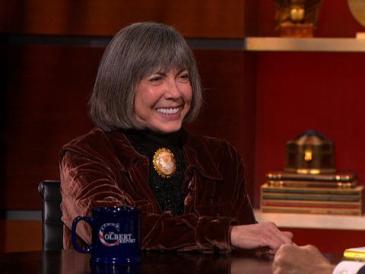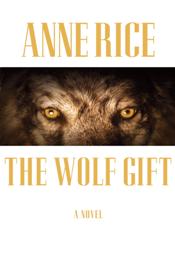Anne Rice On Monsters, Facebook And Fifty Shades Of Grey
By Tony Peregrin in Arts & Entertainment on Apr 13, 2012 4:00PM
The werewolf never gets to be top dog, that is, until Anne Rice set her sights on the iconic, largely misunderstood creature in her new tome The Wolf Gift. The novel marks a return to the author’s familiar Gothic motifs—the old, dark house, a mysterious death, the promise of family secrets, and of course, a supernatural-monster-as-hero.
Rice will be making a series of appearances in Chicago this weekend, including a visit to the 2012 Chicago Comic & Entertainment Expo (C2E2), where she is a featured headliner. Chicagoist spoke with her earlier this week, and found the author to be a fascinating conversationalist—charming, gracious, and at times, delightfully disarming.
Herewith, Rice’s thoughts on monsters-as-storytellers, using Facebook to connect with fans, and her take on the latest publishing phenom, Fifty Shades of Grey.
Chicagoist: Why werewolves—and why now?
Anne Rice: It was suggested to me at the right moment. I was bogged down in a project at a point where I didn’t really like where I was going with it. Jeff Eastin—a producer-friend who I only really know through e-mail—just happened to mention that he had watched a documentary on werewolves and that he would certainly buy a book if I wrote about them. And, you know, it just hit me at the right time. I thought, ‘why not?’ Why don’t I write my take on the myth? Suggestions or ideas from others don’t always stick—but this time it did. Incidentally, Jeff Eastin is the executive producer and creator of the series "White Collar," and Matt Bomer, who stars in the series inspired the character of Reuben Golding in the book.
Chicagoist: You’ve explored other types of writing, but why do you always come back to the monsters to tell your stories, Anne?
Anne Rice: You know—I don’t know why one author writes westerns while another writes detective novels. You don’t know why. You go where the intensity is. I feel most comfortable writing about them. It’s possible that I feel like a monster myself. Or maybe it’s because we all have a monster inside of us, a vampire, a ghost, a witch or a werewolf. You do it because it works and it feels really right and authentic.
Chicagoist: Talk a little about how you created the character of "Reuben," and how he compares to some of your other characters in the Anne Rice Pantheon—like Lestat de Lioncourt.
Anne Rice: Reuben came to life on the page—that old cliché with me is true. When I realized that Reuben was a young man who really wanted to be taken seriously, because he was dismissed for being too good looking or because he had too much money—his character really came to life for me. I began to understand that, and see that a lot of people feel this way— misunderstood because of their talents or gifts or background.
Reuben actually kind of loves killing people! Reuben is a much more positive hero than the vampires. He really enjoys life. Lestat, Louis, Armand, they enjoyed life—but they also suffered terribly, they really wrestled with the darkness. The Wolf Gift doesn’t demand you give up sunlight or sexuality. He’s faced with a very different set of problems, and that really interested me as a writer.
Chicagoist: Why did you decide to have the transformation from man-to-werewolf be a highly pleasurable experience rather than the painful, joint-popping experience we’ve typically seen in the classic werewolf films?
Anne Rice: I asked myself ‘why did it have to be so painful? Why?’ It’s similar to how I wrote about vampires—I didn’t want them to be feral or repulsive like Dracula. From the beginning I thought, ‘why couldn’t they be beautiful, like angels?’
For The Wolf Gift, I just imagined how good it must feel to grow taller and to have all that hair all over your body: Think how good that must feel! I have always had a mop of hair on top of my head, and I have always thought hair was very sensual. I have this kitty here, [Little Prince Oberon] and as I am talking to you, I am stroking its hair, and I can see he is really enjoying this. Hair is sensual.
Chicagoist: I remember in the late ‘90’s you used to leave detailed messages for fans on your phone line, where you would offer updates on your work or you would mention interesting personal details of your life—like the acquisition of a new kitty. Today, your Facebook page seems to have picked up where that phone line left off. Talk a little about how social networking tools like Facebook have impacted you as a person and as an author.
Anne Rice: Well, it’s given me a marvelous outlet. I wrote on a computer, but I didn’t really “know” the internet—I came to it late, in 2003, when I started e-mailing and such. Kim Thornton [a Senior Publicist at Alfred A. Knopf] suggested Facebook to me about four years ago, and I found it to be exactly the kind of outlet I like to communicate with readers. And you’re right—it’s very much like the phone line from years past, which was a wonderful form of communication for me back then. I also used to take out full-page ads in newspapers to talk about what I believed in and people used to get so outraged at that, but now everyone does that with the blogs.[Laughs]. They [Facebook followers] really feed my mind, and that right there is terrific. If I have concerns or questions about what is going on in the world in news and politics, I go to ''the page" and to talk to them about it. I get to ask them simple questions like do they like Game of Thrones, and they get to give me recommendations for books and films.
Chicagoist: You write every post yourself, right? Your status updates and messages to the “People of the Page” sound like you, like your voice.
Anne Rice: I am so glad you think it sounds like me. [Laughs.] It is me, for sure. I write every post.

Anne Rice on The Colbert Report earlier this month.
Anne Rice: I left Christianity because I wanted to be a moral person. That is why I left. I no longer believed in its lies.
Chicagoist: At one point, after you left Catholicism, you had said that attending mass had become somewhat stressful, and that you had had a terrible row with a priest-friend who “compared Obama to Joseph Stalin, due to his pro-choice views on abortion.” I actually find it incredibly alarming that a man of the cloth would actually make such a statement.
Anne Rice: I had always been going to mass, most of the time, but I would take breaks when I wasn’t feeling well, and when the pedophilia scandals came to light, I received permission to miss mass until I could wrap my head around that. That priest did indeed say that Obama was as bad as Joseph Stalin. I still love him, he’s a friend of mine, but that statement is outrageous.
Chicagoist: Your break from the church reminds me of something you’ve referred to as the “modern temper” in today’s world.
Anne Rice: I think there is a modern temper. The authority figures we revered in the past are all up for grabs—they’re gone. We are groping for meaning in a world where some of our gods have died. We’re asking ourselves, ‘Who is our true brother and sister, where is our true home?’ The modern tempter is our struggle to lead meaningful lives, and even if we don’t believe in religion, we can reach down and hold on to our core values for guidance.
Chicagoist: You attended what is generally considered to be the mothership of all comic-cons—San Diego Comic-Con—last summer, and you’ll be at Chicago’s C2E2 event this weekend. What do you enjoy about the Comic-Con atmosphere as compared to a typical book signing or author appearance?
Anne Rice: I love the exuberance of the Comic-Cons, the costumes, the frank enjoyment of it all! I love the upfront attitude of ‘hey, we are fans of this and that and we’re here to have a good time!’ Signings can have that too, of course, but they are limited to the book or author at hand, while Comic-Cons are wide open. I loved walking through the San Diego Comic-Con. These events attract all of these rank-and-file lovers of the arts, not the literary elite, and I find that very inspiring.
Chicagoist: Comic-Cons obviously attract super-fans, and for novelists, that sometimes includes writers who dabble in fan-fiction. E.L. James’ Fifty Shades of Grey trilogy—which is currently taking the publishing world by storm—started out as online fan-fiction of the Twilight series. How do you feel about fan-fiction?
Anne Rice: I don’t ever want to read about my characters in someone else’s writing. It’s too upsetting for me, because they are mine and from my mind. I never read fan fiction. Other writers feel differently about it and are happy and encouraging of it. I don’t make judgments—I prefer to ignore it. But if [Fifty Shades of Grey] grew out of that, well, there are no rules—books can come out in any variety of ways.
 Chicagoist: There are no rules—or there shouldn’t be—except maybe when it comes to what has been dubbed the “mommy porn” themes in Fifty Shades of Grey. You’ve said the moral outrage concerning women’s interest in reading about dominance and submission in books such as Fifty Shades of Grey is ridiculous—which is not surprising as you’ve never shied away from erotica in your own writing.
Chicagoist: There are no rules—or there shouldn’t be—except maybe when it comes to what has been dubbed the “mommy porn” themes in Fifty Shades of Grey. You’ve said the moral outrage concerning women’s interest in reading about dominance and submission in books such as Fifty Shades of Grey is ridiculous—which is not surprising as you’ve never shied away from erotica in your own writing.
Anne Rice: Well, I was surprised at the uproar, and the sanctimonious tone of these critics! Why should we be alarmed that women have sadomasochist fantasies? Men have them. When Bill Bennett scolded fans of Fifty Shades of Grey, I thought ‘How dare you!’ Being liberated means reading what you want to read, and fantasizing about what you want to fantasize about. I think the reason there is such a controversy right now about this is because women are more open about it now, that’s why it’s making headlines. Women are out of the closet! When I published as A.N. Roquelaure it was really underground stuff, but I think it’s healthy to be more in the open about it, and I’m really glad to see it.
Chicagoist: What are some of your favorite haunts in Chicago?
Anne Rice: I love walking along Michigan Avenue—it’s beautiful and stimulating. In the past, I’ve visited the Newberry Library and I had such a good experience there conducting research and looking at Renaissance books on witchcraft. We once went to a wonderful exhibit at the Art Institute. I was with Stan and Christopher, when he was 10, and we saw a Monet exhibit there. I also got a chance to see this painting by Seurat, A Sunday Afternoon on the Island of La Grande Jatte, which I had studied a lot as a grad student, and to see it on the wall was incredible.
Chicagoist: You once described your ideas for new projects as a bunch of “zombies on the porch, fighting to get inside.” Have any of those zombies managed to claw their way through the front door and onto paper or computer screen at this point?
Anne Rice: [Laughs.] Yes. I am working on new book, but that’s all I can really say right now. I want to be more sure [about the project], and have more pages written before I do. But I can tell you it does have to do with classic supernatural monsters.
Saturday, April 14: Anne Rice is attending the RT Booklovers Convention, taking place at the Hyatt Regency O’Hare Hotel.
Sunday, April 15: Anne Rice is a spotlight guest at 2012 C2E2 Expo at McCormick Place (North Building). The first five fans in her autographing line in full costume from one of Anne’s books will receive a free book!
Monday, April 16: Anne Rice will be at a meet and greet at Anderson’s Bookshop, Naperville.
